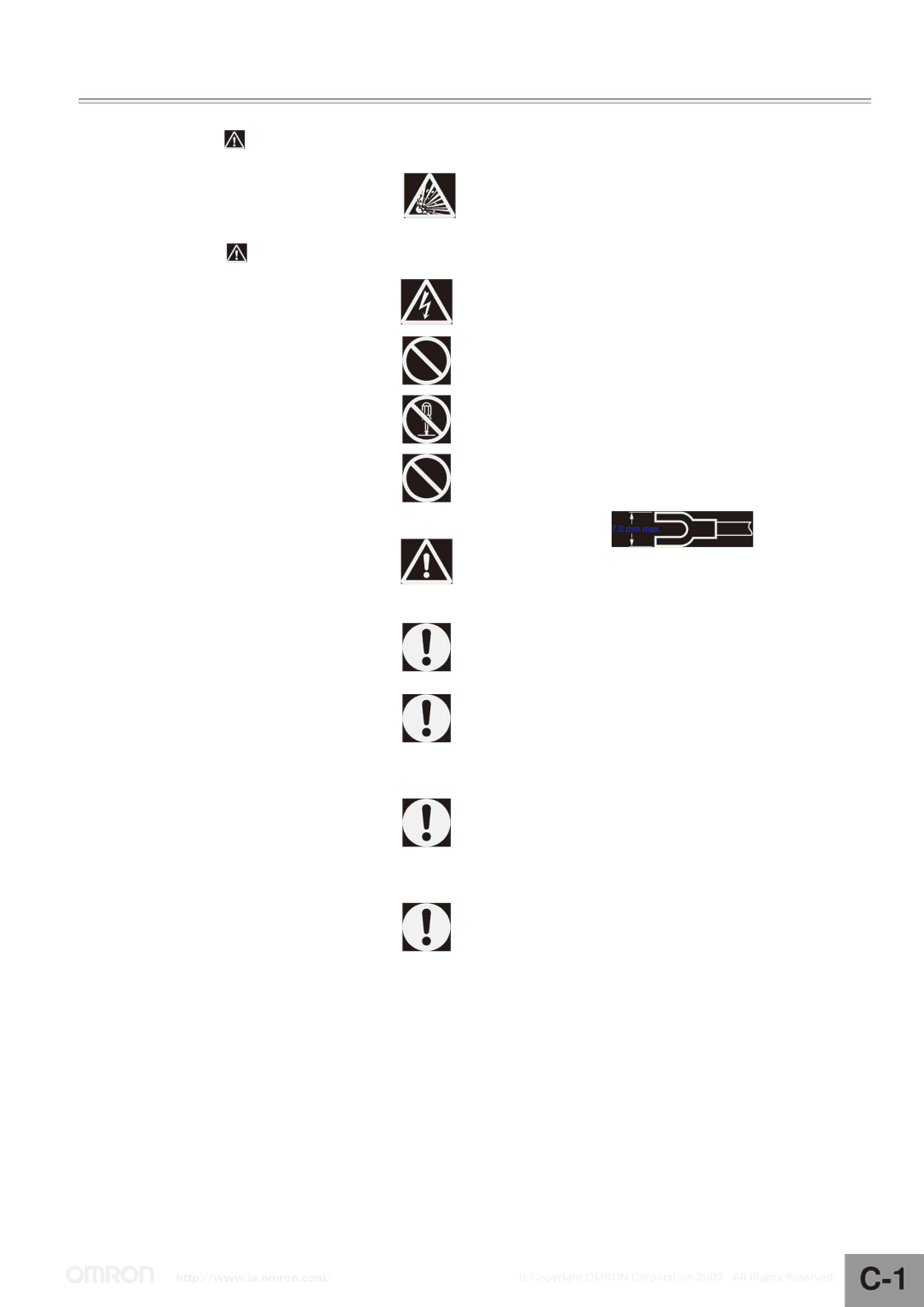Refer to the precautions of individual product for more specific details.
 Warning
Warning
The following products contain lithium batteries. Do not disassemble, deform under pressure, heat to over 100°C, or incinerate these products. The lithium bat- tery may ignite or explode. Applicable models: E5ZE, E5LD, and E5LC.
 Caution
Caution
Do not touch any of the terminals while the power is being supplied. Doing so may result in electric shock.
Do not allow pieces of metal or wire cuttings to get inside the Temperature Controller. Doing so may result in electric shock, fire, or malfunction.
Do not attempt to disassemble, repair, or modify the Temperature Controller. Any attempt to do so may result in electric shock, fire, or malfunction.
Do not use the Temperature Controller in locations subject to flammable or explosive gases. Doing so may result in an explosion.
The switching capacity and switching conditions will significantly affect the longevity of the output relays. Use the Temperature Controller within the rated load, and do not use the Temperature Controller beyond the number of operations specified under electrical life. Using the Temperature Controller beyond its electrical life may result in contact welding or burning.
Use Temperature Controller settings that are appropriate for the controlled system. Failure to do so may cause unexpected operation resulting in damage to equipment or personal injury
Prepare a circuit with an overheating prevention alarm and implement other safety measures to ensure safe operation in the event of a malfunction. Loss of operational control due to malfunction may result in a serious accident.
Tighten the terminal screws to the following torque:
M3.5 screws: 0.74 to 0.90 N·m
M3 screws: 0.40 to 0.56 N·m
E5GN: Terminals 1 to 6: 0.23 to 0.25 N·m Terminals 7 to 9: 0.12 to 0.14 N·m
Failure to tighten terminal screws to the correct torque may result in fire or malfunction.
Make sure there will be no adverse affects from the device connected to the Temperature Controller before using the hardware test mode. Devices connected to the Temperature Controller may reach a dangerous state during the test.
Operating Environment Precautions
1.Do not use the Temperature Controller in the following locations:
•Locations exposed to radiated heat from heating devices
•Locations subject to exposure to water or oil
•Locations subject to direct sunlight
•Locations subject to dust or corrosive gases (in particular, sulfide gas and ammonia gas)
•Locations subject to severe changes in temperature
•Locations subject to icing or condensation
•Locations subject to excessive shock or vibration
2.Use and store the Temperature Controller within the rated temperature or humidity range specified for each model. When two or more Temperature Controllers are mounted hor- izontally close to each other or vertically next to one another, the internal temperature will increase due to the heat they radiate and the service life of the products will decrease. In such cases, forced cooling by fans or other means of air ven- tilation will be required to cool down the Temperature Con- trollers.
3.Allow enough space around the Temperature Controller to ensure proper heat dissipation. Do no block the ventilating holes.
4.Be sure to wire properly with correct polarity of terminals.
5.To wire the E5AN, E5EN, or E5CN using crimp terminals, use crimp terminals designed for M3.5 screws and with a width of 7.2 mm max.
7.2 mm max.
6.When wiring the E5GN, use a cable gauge of AWG24
(0.205 mm2) to AWG14 (2.081 mm2) for terminals 1 to 6, and use a cable gauge of AWG28 (0.081 mm2) to AWG22
(0.326 mm2) for terminals 7 to 9. The exposed current-carry- ing part to be inserted into terminals must be 5 to 6 mm.
7.After wiring is completed, do not pull on or bend a terminal block lead wire with a force of 30 N or higher.
8.Do not connect anything to unused terminals.
9.Make sure that the power supply voltages and loads are within specification and rating ranges before using the Tem- perature Controller.
10.To avoid inductive noise, keep the wiring for the Temperature Controller's terminal board away from power cables carrying high voltages or large currents. Also, do not wire power lines together with or parallel to Temperature Controller wiring.
Using shielded cables to separate pipes and ducts is recom- mended.
Attach surge absorbers or noise filters to peripheral devices that generate noise (e.g., motors, transformers, solenoids, magnetic coils, or other equipment that has an inductance element). If using a noise filter with the power supply, be sure to confirm the voltage and the current, and then mount the power supply as near as possible to the Temperature Con- troller.
Set up the Temperature Controller, along with its power sup- ply, as far away as possible from devices that generate strong, high-frequency waves, such as high-frequency weld- ers and high-frequency machines, and from devices that gen- erate surges.
11.Make sure that the rated voltage is attained within two sec- onds of turning the power ON.
12.Allow at least 30 seconds for the Temperature Controller to warm up.
13.When using self-tuning, turn ON power for the load (e.g., heater) at the same time as or before supplying power to the Temperature Controller. If power is turned ON for the Tem- perature Controller before turning ON power for the load, self-tuning will not be performed properly and optimum con- trol will not be achieved.

